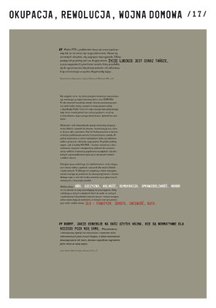
The fight between the PPR [Polish’s Workers’ Party] and the underground is becoming more and more fierce, with no end in sight. All sorts of tricks are being used to bring the enemy down. There are casualties on both sides. Human life is becoming ever cheaper, and the struggle claims victims among the nation’s best and brightest, which would be needed to consolidate the regained liberty and the rebuilding of the country, destroyed by the long war.
Wojciech Kuraś, Wspomnienia o mojej wsi Waksmund, Waksmund 1982, p. 421.
Whether we call the immediate aftermath of the war a new occupation, a revolution, a civil war or a peasants’ revolt, it was still a time of Terror. The people who stood against each other on the opposite sides of the barricades all believed they were working towards a free and independent Poland. Although their visions of the new political order differed, they spoke the same language, learned from the same primer as children and sang the same hymn.
All of them had experienced the oppression of the German occupation – loss of their loved ones, deportation to camps, backbreaking work, life in hiding, in fear and in humiliation. Five years of living in a world in which basic humanitarian values had officially been suspended and the daily struggle for survival became the primary objective had certainly taken their toll. In this war between Poland and Poland, as in any war, heroism was interlaced with cruelty, empathy with indifference, and the capability for great deeds with an easy propensity for crimes, the justification for which is still being sought in beautiful slogans and lofty ideals.
The words GOD, HOMELAND, LIBERTY, DEMOCRACY, JUSTICE, HONOUR and SOLIDARITY have not lost their irresistible pull. They still continue to mobilise people from all corners of the world to fight on real and imagined barricades, against enemies new and old. All too often, they become the cover to hide the EVIL that tyrannises small and great worlds – FANATICISM, VENGEANCE, GREED and HUBRIS that silences the voice of conscience.
The norms war generates within itself are not normative beyond itself. This omnivorous appetite to encroach and consume other norms of other gods, suspending their norms, is war's gravest danger.
James Hillman, A Terrible Love of War, New York 2004, p. 29
